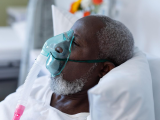Two thirds of family members restricted from visiting their loved ones admitted to an intensive care unit (ICU) for COVID-19 had significant symptoms of posttraumatic stress disorder (PTSD) 3 months later, with the greatest severity in those of Hispanic ethnicity, female sex, and previous use of a psychiatric drug, according to a study published yesterday in JAMA Internal Medicine.
A team led by University of Colorado researchers administered the Impact of Events Scale 6 (IES-6) questionnaire, the Hospital Anxiety and Depression Scale (HADS), and the Family Satisfaction in the ICU-27 (FS-ICU27) to 330 family members. The interviews took place 3 or 4 months after their loved ones were admitted to an ICU for COVID-19 from Feb 1 to Jul 30, 2020, at 1 of 12 hospitals in Colorado, Louisiana, Massachusetts, New York, and Washington.
Early in the pandemic, amid a shortage of personal protective equipment, hospitals eliminated patient visits in an effort to prevent viral transmission, and they still limit visitation to varying degrees today, the researchers noted.
Average participant age was 51.2 years, 69.1% were women, 52.8% were White, 29.8% were Hispanic, 25.0% were Black, 13.7% were of another race, and 8.5% were Asian or Pacific Islander, Native American, or Native Indian. Most participants were the patient's child (40.6%) or partner (25.5%).
Significant anxiety, depression
Three months after their family member was admitted to an ICU, 64% of participants reported PTSD symptoms such as depression and anxiety, up from 30% before the pandemic. Average number of days from patient ICU admission to participant contact was 122.6, and 41.3% of patients died in the hospital.
One participant described a highly distressful situation to a study interviewer, according to a University of Colorado press release: "They called us and said, 'Do you want us to pull the plug?'... I said how did it go from coming home to pulling the plug? ... they say that her mouth was moving and her eyes was moving but they said she was dead. ... so, they went on and pulled the plug anyway."
Average participant IES-6 score was 11.9, and 63.6% scored 10 or higher, indicating significant PTSD symptoms. Female family members had an adjusted average IES-6 score that was 2.6 points higher than their male counterparts, and Hispanic participants scored, on average, 2.7 points higher than their non-Hispanic peers. Participants who used a psychiatric drug within 1 year had average IES-6 scores 3.0 points higher than those who did not.
A subset of 155 patients reinterviewed at 6 months had an average IES-6 score of 10.1, with 48.4% scoring 10 or higher. Family members of patients admitted in April 2020 scored an average of 1.2 higher on the IES-6 than those admitted in February and March.
The adjusted average IES-6 score of family members with graduate school experience was 3.3 points lower than those with a high school diploma or equivalent. Qualitative analyses showed no substantive differences in the emotional or communication-related experiences in participants with high versus low IES-6 scores, although those who scored higher were more distrustful of healthcare practitioners.
Average HADS score was 7.3 on the 7 anxiety-related questions and 5.4 on the 7 depression-related questions. Of the 314 participants who answered the anxiety questions, 44.9% scored 8 or higher, as did 31.0% of the 313 who answered the depression questions, indicating significant anxiety or depression.
Interviews at 6 months revealed an average HADS anxiety score of 6.3 and an average depression score of 5.0. Fifty-three of 154 participants (34.4%) who answered the anxiety questions scored 8 or higher, as did 25.2% of the 155 who answered the depression questions.
Acts of compassion
Twenty-one family members described compassionate acts such as exceptional communication, extra touches for patients (eg, allowing a patient a soda for breakfast), or addressing isolation (eg, hanging signs in windows so families could identify their loved one's room from outside the hospital).
Participants with IES-6 scores below 10 (10 of 25 [40.0%]) and those who were non-Hispanic (19 of 54 [35.2%]) reported compassionate events more often than those with IES-6 scores of 10 or higher (11 of 49 [22.4%]) and those who were Hispanic (2 of 17 [11.8%]).
"It is possible that receiving or perceiving fewer acts of compassion may help explain the association of increased IES scores or that bedside exclusion prevented families from engaging in culturally important bedside care rituals," the authors wrote. "Prior studies highlight that those identifying as Hispanic are more likely to use touch at the bedside and be involved in patient care and that bedside care rituals may help reduce psychological distress."
The results suggest that visitation restrictions may have inadvertently contributed to a secondary public health crisis of PTSD, lead author Timothy Amass, MD, ScM, said in the release. "As such," the study authors write, "establishing rapport with family members in creative and innovative ways may help to offset the physical distance."
The authors noted that patients and families who experience a loss of control over a situation may be more prone to PTSD symptoms. "Many of the acts of compassion restored, at least to some extent, aspects of control, and these acts may foster an increased trust with clinicians," they wrote.
Further studies, they said, are needed to find ways to reduce the impact of visitor restrictions of ICU patients who have infectious diseases such as COVID-19.
"Additional research is needed to explore opportunities to improve family members' experiences when they cannot be present while their loved one is admitted to the ICU and to determine the degree to which these symptoms persist and for how long," they concluded. "Developing an understanding of the effect on patients' family members may help identify mechanisms to mitigate the repercussions when family members are unable to be at the bedside because of the pandemic or for other reasons."





















